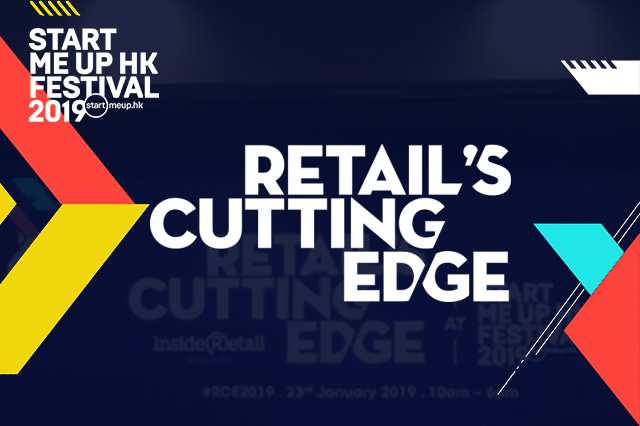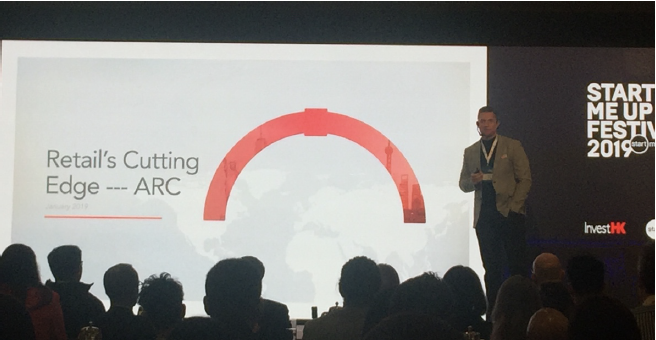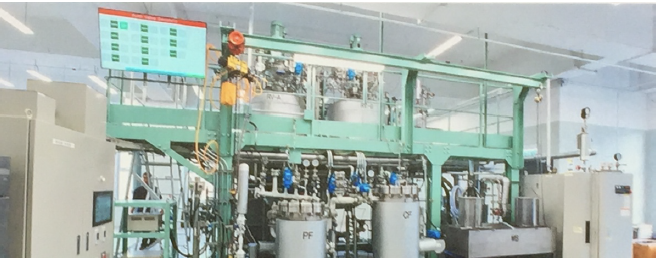
albert Chan
The Coresight Research team attended the Retail’s Cutting Edge conference, part of the StartmeupHK Festival 2019, a platform for startups, entrepreneurs, investors, industry leaders, students and academics to exchange ideas and make connections. The conference was part of an initiative launched by InvestHK, a government body charged with promoting Hong Kong as a location for international businesses. The event focused on retail topics such as omnichannel strategies to sustainability.
Fung Retailing Steps Up Efforts in China Entry Strategies with Alibaba
Dustin Jones, Managing Director of Fung Retailing Group, shared how foreign retailers can more easily enter the China market, leveraging Fung Retailing’s China expertise and supply chain capabilities — and its recent strategic partnership with Alibaba that deepens its reach and strengthens its digital capabilities.
The key to success is a comprehensive omnichannel strategy designed for the unique nature of the China market, including distinct regional variations.
Retailers can draw on Alibaba’s ecosystem, including Tmall and department store chain Intime, as well as Fung Retailing’s physical stores — in addition to gaining access to data on the 600 million unique Alibaba customers to cater product offerings and promotions.
[caption id="attachment_66833" align="aligncenter" width="656"] Dustin Jones, Managing Director of Fung Retailing Group, speaking at the Retail’s Cutting Edge Conference
Dustin Jones, Managing Director of Fung Retailing Group, speaking at the Retail’s Cutting Edge Conference
Source: Coresight Research[/caption] Long Live Brick and Mortar! Brick-and-mortar stores are not dead. Online has boomed in recent years in China, and accounted for 55% of retail sales in 2018 — but 45% of sales still took place in physical stores and consulting firm OC&C Strategy Consultants expected the share of offline retail in China to continue rising. In fact, many digital companies, such as Alibaba and Tencent, are investing in traditional retailers, transforming them into New Retail hybrids. Alibaba invested in supermarket chains San Jiang, New Huadu and Sun Art, and department store chain Intime. Tencent invested in supermarket chains Yonghui Group and Carrefour China. These companies recognize that in-store experiences help customers connect to products, supporting online sales. U.S. eyewear company Warby Parker added showrooms so customers can try on their products — and subsequently saw an increase in online sales. Alibaba’s New Retail signature Freshippo supermarkets (formerly known as Hema) can give us a glimpse of the future of retail and how companies are reinventing offline retail to complement online offerings. Freshippo brings in new formats, including in-store dining, retail space, warehouse and processing centers, and cutting-edge technology such as using a smart phone to scan products and pay. Alibaba says that Freshippo generates higher revenue per square meter than the average retailer in China. Renew Fashion with Sustainability The Boston Consulting Group (BCG) and Global Fashion Agenda (GFA) predict the world’s consumption of apparel and footwear will climb from 62 million tons in 2015 to 102 million tons by 2030. The fashion industry already faces sustainability challenges, and this substantial consumption growth will only make the challenge more daunting. Fortunately, many people in the industry and also nonprofit organizations have been working to find creative solutions. One of them is H&M Foundation, which has been working with brands to reduce their impact on the environment. One example is a new technology that combines heat, water and a biodegradable agent to recycle mixed-fiber textiles. The separated materials, such as polyester and cotton fibers, can then be re-used in new textile production. [caption id="attachment_66834" align="aligncenter" width="656"] Textile Recycling Set
Textile Recycling Set
Source: Coresight Research[/caption] Takeaways Fung Retailing has upped its game with a strategic alliance with Alibaba to better help brands enter China. Physical stores are not dead, and in fact digital brands are now entering the brick and mortar space. Alibaba’s Freshippo stores are a good example, and offer a glimpse of what the future of retail might look like. Companies are looking to technology innovation to help them to do business in a more sustainable way.
 Dustin Jones, Managing Director of Fung Retailing Group, speaking at the Retail’s Cutting Edge Conference
Dustin Jones, Managing Director of Fung Retailing Group, speaking at the Retail’s Cutting Edge ConferenceSource: Coresight Research[/caption] Long Live Brick and Mortar! Brick-and-mortar stores are not dead. Online has boomed in recent years in China, and accounted for 55% of retail sales in 2018 — but 45% of sales still took place in physical stores and consulting firm OC&C Strategy Consultants expected the share of offline retail in China to continue rising. In fact, many digital companies, such as Alibaba and Tencent, are investing in traditional retailers, transforming them into New Retail hybrids. Alibaba invested in supermarket chains San Jiang, New Huadu and Sun Art, and department store chain Intime. Tencent invested in supermarket chains Yonghui Group and Carrefour China. These companies recognize that in-store experiences help customers connect to products, supporting online sales. U.S. eyewear company Warby Parker added showrooms so customers can try on their products — and subsequently saw an increase in online sales. Alibaba’s New Retail signature Freshippo supermarkets (formerly known as Hema) can give us a glimpse of the future of retail and how companies are reinventing offline retail to complement online offerings. Freshippo brings in new formats, including in-store dining, retail space, warehouse and processing centers, and cutting-edge technology such as using a smart phone to scan products and pay. Alibaba says that Freshippo generates higher revenue per square meter than the average retailer in China. Renew Fashion with Sustainability The Boston Consulting Group (BCG) and Global Fashion Agenda (GFA) predict the world’s consumption of apparel and footwear will climb from 62 million tons in 2015 to 102 million tons by 2030. The fashion industry already faces sustainability challenges, and this substantial consumption growth will only make the challenge more daunting. Fortunately, many people in the industry and also nonprofit organizations have been working to find creative solutions. One of them is H&M Foundation, which has been working with brands to reduce their impact on the environment. One example is a new technology that combines heat, water and a biodegradable agent to recycle mixed-fiber textiles. The separated materials, such as polyester and cotton fibers, can then be re-used in new textile production. [caption id="attachment_66834" align="aligncenter" width="656"]
 Textile Recycling Set
Textile Recycling SetSource: Coresight Research[/caption] Takeaways Fung Retailing has upped its game with a strategic alliance with Alibaba to better help brands enter China. Physical stores are not dead, and in fact digital brands are now entering the brick and mortar space. Alibaba’s Freshippo stores are a good example, and offer a glimpse of what the future of retail might look like. Companies are looking to technology innovation to help them to do business in a more sustainable way.